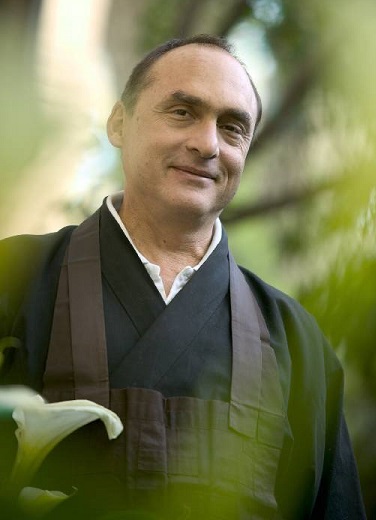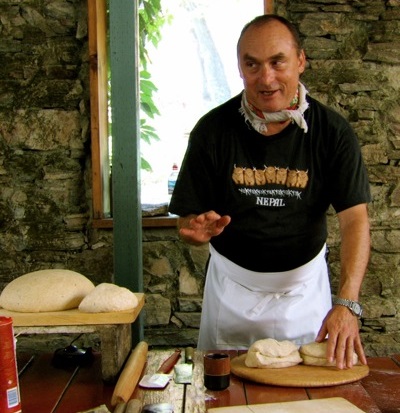ZEN MESTEREK ZEN MASTERS
« Zen főoldal
« vissza a Terebess Online nyitólapjára

Edward Espe Brown (1945-)
Ed Brown
was ordained in 1971 by Shunryū
Suzuki Rōshi, who gave him the Dharma name
壽山海寧 Jusan Kainei, which means "Longevity Mountain, Peaceful Sea."
Edward Brown has been practicing Zen since 1965. Ordained as a priest by Suzuki Roshi in 1971, he received Dharma Transmission from Mel Weitsman in 1996.
He was the first head resident cook at Tassajara Zen Mountain Center from 1967 to 1970. He later worked at the celebrated Greens Restaurant in San Francisco, serving as busboy, waiter, floor manager, wine buyer, cashier, host, and manager. He has taught meditation retreats and vegetarian cooking classes throughout North America and Europe. He is the author of several books and also has edited a book of Suzuki Roshi lectures, Not Always So. Ed is the founder and teacher of the Peaceful Sea Sangha. He is the subject of the critically acclaimed 2007 film How to Cook Your Life.
http://en.wikipedia.org/wiki/Edward_Espe_Brown
http://www.cuke.com/people/brown-edward.htm
http://www.cuke.com/bibliography/brown/Ed%20Brown%20books.html
Autobiography (1983)
by EDWARD BROWN Jusan Kainei - (Longevity Mountain, Peaceful Sea)
Wind Bell, Winter 1983, pp. 13-14.
Suzuki-roshi said about my name: "You will be like a mountain surrounded by a sea of people."
Birthdate: March 24, 1945.
Began sitting zazen in May, 1965.
Thought I would get enlightened in a year or two (by trying harder, those ocher people did not know what effort meant) and go about my life. It did not happen that way.
Went to Tassajara in May, 1966 when the Becks still owned the place. Suzuki-roshi said we were "carrying water and gathering wood." Learned how to cook. Decided it was crazy to sit zazen, if one took the conventional or parental viewpoint, it was useless, but there are other scales and measures.
Became head cook Tassajara Zenshin-ji May, 1967. Expectations of becoming a famed cook and respected monk were thoroughly crushed, people did nor go for ic. Stuck it our, anyway. Decided ic was most important to acknowledge each person's authority and capacity, and nor just mine.
Ordained a priest September 11, 1971. Suzuki-roshi said char if you become a priest you cannot be a baker.
Was Slzuso at Tassajara, Fall of 1973. This completed nearly seven years residence at Tassajara. Thirteen practice periods. Looking back I remember che benefits: heat in the summer and cold in che winter.
Authored rhe Tassajara Bread Book somewhere in there (pub. 1970) and Tassajara Cooking (pub. 1973).
Climbed the position ladder at ZC, 1974-78, or should we say, "pushed up"? Guest manager, 1974; !no, 1975; Tama, 1975-1977; President, 1976-1978. Approximate dates, Tanro and president overlapping.
Taught srudy center classes for years, gave lectures, did practice instruction, burned out. Stopped.
Dropped out co practice zen and attain true realization summer of 1979. Became busboy at Greens. Did therapy. Lost my seat in the zendo. Stopped t rying to enlighten others by "correcting" their understanding. What's the poinc of a golden tongue, when my life is a mess?
Started reaching study center classes again, fall, 1980. Have taught Intro. to Zen, Intro. to Buddhism, beginning Abhidharma, Genjo Koan, Gakudoyojinshu.
Left out getting married in June, 1970, daughter born April, 1973, divorced June, 1977. Daughter Lichen now living in France. Lately have been particularly interested in studying and working on communication skills which reveal, clarify, and support the individual and the discourse, rather than "mucking up" everything. Zen is not something to do to avoid developing communication skills.
March, 1983, decided I was a nice person, and it really is OK to make mistakes and have problems.
Books
Interviews
What Should We Be Tasting Now?
Edward Espe Brown in an interview with Stefan Laeng-Gilliatt
http://joyfuldharma.org/2012/07/11/what-should-we-be-tasting-now/
“When you are you, Zen is Zen”: A conversation with Edward Espe Brown
by Catherine Gammon
http://blogs.sfzc.org/blog/2013/11/26/conversation-with-edward-brown/
I still appreciate Suzuki Roshi saying, “When you are you, Zen is Zen.” He didn't say when you get to be Zen enough, then you'll have really gotten somewhere. So much of Suzuki Roshi's way was to find out what's appropriate for the occasion and what works for people. —Edward Brown
Edward Espe Brown: The Zen cook
http://www.culinate.com/articles/the_culinate_interview/edward_espe_brown
By Emily Puro
November 6, 2007
Why are Zen practice and cooking so compatible?
One of the basic things — which isn’t just for cooking but for other forms of work as well — is that Zen, since pretty much its inception in China, has emphasized work as a form of spiritual practice. Zen emphasizes attention to detail and taking care of things, being careful and sincere and thorough in your effort, and that seems as useful as anything in cooking.
I think the part of cooking that’s emphasized in books and things is your genius or your creativity, and that’s all well and good. But cooking is a lot of work, so there’s that kind of encouragement to actually work and do something thoroughly and carefully. That means there’s not dirt in the salad, the rice is not raw, it’s not burned. When you care for things that way, you have some pretty good food, even if it’s not genius.

Edward Espe Brown teaching a breadmaking class.
There’s so much emphasis today on convenience foods. Do you think cooking has lost value in our society?
Yeah, I think it has, and I think that goes along with just generally the value of working with your body, working with your hands. For me, I find it very energizing and inspiring to do something with my hands. That may be just me, but apparently more than a third of the connection between the mind and the body is with the hands, in terms of sensory neurons and motor neurons from the body to the mind. So you become much more embodied and in a certain sense you’re much more alive and less living just in your head. You have a fuller existence, and your body has a different kind of well-being when you’ve actually done something.
Nowadays there’s so little respect for work, and so little valuing of it. People spend 12 or 16 years or more in school doing things with their heads, so that’s the only thing that’s valuable. The things you could do with your body aren’t passed on from generation to generation, so we grow up without the skills, whether it’s cooking or gardening or carpentry or plumbing or sewing or art or all kinds of things that have been a large part of the human culture. In some ways, it’s a kind of impoverishment. But maybe I’m just me and I’m missing something.
How does being mindful change what we eat as well as how we eat?
Mindfulness is to be aware without judging good, bad, right, or wrong. Sometimes people use “mindful” to mean you do it like this, you don’t do it like that, but basically whatever you’re experiencing, whether it’s eating or walking down the street, a part of your awareness is studying carefully what you’re experiencing. That leads you to conclusions which are your own knowledge or wisdom based on your own careful study. That’s very powerful knowledge compared to what you read in a book. When I eat hydrogenated fats, I feel pretty bad. When you experience that closely enough, you don’t want to do it anymore. You’re noticing and it’s registering in your consciousness and then it changes your behavior.
How can we be more mindful of our eating?
How to be more mindful is be rather more careful about actually tasting and noticing what you put in your mouth and experiencing what you’re eating and the feelings in your body, giving your attention to those things.
I also think it includes being aware of enjoyment, and there’s a whole range of possibilities there, from disgust or distaste to mild pleasure to enjoyment to gluttony and lust and greed. At some point with food there can be a kind of excitement that just takes one over, and then it’s very hard to be mindful anymore, so part of it is not just studying what you eat but also how you eat.
What advice do you give students who want to develop their intuition when it comes to cooking, rather than always having to follow a recipe?
In cooking classes I emphasize adding one ingredient at a time and tasting before and after, so you start to know for yourself what each ingredient is doing. If you just put everything in the pot and taste it, you don’t know why it tastes like it does. You don’t know what each ingredient is doing. If you add one ingredient at a time and taste it, you start to know what a spice or seasoning can do.
What I tell people to develop their intuition is to actually taste things carefully and catalog what your experience is, and then that comes up without your asking for it. It’s in your body and your being, and that comes to you [when you’re cooking] and you know what you want to do.
You emphasize the importance of maintaining very sharp knives. Why is that so important for a cook?
Obviously there are different kinds of cooks. I happen to really enjoy working with a sharp knife, so my cooking reflects that. For me, the basic thing is that cut surface releases flavor. If you bite into an apple, every bite of apple that you eat has all this skin on it. If you cut the apple in quarters and cut out the core and slice it, every slice of apple has all this inner fruit and a little thin piece of skin on the edge. The flavor just comes right off that cut surface and the apple tastes really good. This is true with all kinds of things. When you have the cut surface, people bite into things and there’s all this flavor.
Featured recipe
What do you hope viewers will take away from the documentary?
I’m not really hoping for anything in particular. My interest has been to help people wake up, and waking up in this case means that when you taste what you put in your mouth and you study what taste is and what flavor is and what cooking is actually like for you, when you study that and you’re alive in that, then that’s something that’s woken up in your life.
I’m interested in people waking up to the possibilities in food and cooking and nurturing and sustenance and well-being. That doesn’t mean necessarily that they cook, but that they wake up to some of the possibilities in their lives.
佛祖正傳菩薩大戒血脈
Busso shōden bosatsu daikai kechimyaku
The Bloodline of the Buddha’s and Ancestors’ Transmission of the Great Bodhisattva Precepts
永平道元 Dōgen Kigen (1200-1253)
孤雲懐奘 Koun Ejō (1198-1280)
徹通義介 Tettsū Gikai (1219-1309)
螢山紹瑾 Keizan Jōkin (1268-1325)
峨山韶碩 Gasan Jōseki (1275-1366)
太源宗真 Taigen Sōshin (?-1371)
梅山聞本 Baizan Monpon (?-1417)
恕仲天誾 Jochū Tengin (1365-1437)
眞巖道空 Shingan Dōkū (1374-1449)
川僧慧濟 Sensō Esai (?-1475)
以翼長佑 Iyoku Chōyū
無外珪言 Mugai Keigon
然室輿廓 Nenshitsu Yokaku
雪窓鳳積 Sessō Hōseki
臺英是星 Taiei Zeshō
南甫元澤 Nampo Gentaku
象田輿耕 Zōden Yokō
天祐祖寅 Ten'yū Soen
建庵順瑳 Ken'an Junsa
朝國廣寅 Chōkoku Kōen
宣岫呑廣 Senshū Donkō
斧傳元鈯 Fuden Gentotsu
大舜感雄 Daishun Kan'yū
天倫感周 Tenrin Kanshū
利山哲禪 Sessan Tetsuzen
富山舜貴 Fuzan Shunki
實山默印 Jissan Mokuin
湷巖梵龍 Sengan Bonryū
大器敎寛 Daiki Kyōkan
圓成宜鑑 Enjo Gikan
祥雲鳳瑞 Shōun Hōzui
砥山得枉 Shizan Tokuchu
南叟心宗 Nansō Shinshū
觀海得音 Kankai Tokuon
古仙倍道 Kosen Baidō
逆質祖順 Gyakushitsu Sojun (187?-1891)
佛門祖學 Butsumon Sogaku (1858-1933) [Suzuki Shunryū's father; Gyokujun So-on's master]
玉潤祖温 Gyokujun So-on (1877-1934)
祥岳俊隆 Shōgaku Shunryū (1904-1971) [鈴木 Suzuki]
牛岳包一 Gyūgaku Hōitsu (1939-) [鈴木 Suzuki; eldest son of Suzuki Shunryū]
白竜宗純 Hakuryū Sōjun (1929-2021) [Mel Weitsman]
壽山海寧 Jusan Kainei (1945-) [Edward Espe Brown]